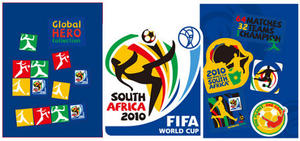World Cup watchGoing to South Africa for the World Cup? Stay low and keep out of the line of fire
The U.S. Department of State issues a travel advisory to Americans going to South Africa this summer for the World Cup; the Department’s discussion of crime in South Africa makes for a depressing reading; noting that “South Africa also has the highest incidence of reported rape in the world,” the Department advises victims of violent crime, especially women who were raped, “to seek immediate medical attention, including antiretroviral therapy against HIV/AIDS”

World Cup Football in South Africa this year // Source: everyjoe.com
Keep your fingers crossed for the World Cup games in South Africa this summer. Many argued from the start that FIFA’s decision to hold the games in a far-away, crime-ridden country was a mistake. FIFA said two weeks ago that 500,000 tickets remained unsold, and event specialists say the number is much higher since most of the tickets now marked as “sold” were sold to brokers and travel agents. These commercial partners have to right to return the unsold tickets to FIFA, so expect a few hundreds of thousands additional ticket to be moved from the sold to the unsold column.
Some people did buy tickets, and the U.S. Department of State has put a travel advisory on its Web site for those Americans traveling to South Africa this summer. The Department notes that “As of January 2010, Americans have bought more tickets for the 2010 World Cup in South Africa than any other outside national group.” They are right: 118,945 Americans have bought tickets to the games. The reason the number of Americans appears so high is that fans from countries in which soccer is much more popular have decided to stay away. In the United Kingdom, for example, only 67,654 World Cup tickets have been sold — fewer than the number of fans who typically attend a weekend game of Manchester United or Arsenal. The number of Germans going to South Africa is half that — 32,269 (see “Security Concerns Hobble World Cup; FIFA Fears Games Played in Empty Stadiums,” 12 April 2010 HSNW).
The Department, aware of its responsibilities, offers a detailed, 1,700-word discussion of crime in South Africa and how Americans should conduct themselves so as not to be touched by it. Every American traveling to South Africa should read this discussion for his or her own safety. We just do not know how many of them will still go after they read it.
The account contains so many depressing facts, it was difficult to choose one or two examples to illustrate what the Department of State warns U.S. citizens of. We selected two: one advises victims of violent crime, especially women who are raped, immediately to seek antiretroviral therapy against HIV/AIDS. The other advises American in a restaurant not to give their credit card to the waiter because he or she is likely to walk away with it. In the words of the Department of State:
- South Africa also has the highest incidence of reported rape in the world. Foreigners are not specifically targeted, but several have been the victims of rape. Victims of violent crime, especially rape, are strongly encouraged to seek immediate medical attention, including antiretroviral therapy against HIV/AIDS. Questions about how to receive such treatment should be directed to the nearest U.S. Embassy or Consulate.
- When giving your credit card to a store or restaurant employee for processing, do not let the card out of your sight. Most South African restaurants have portable credit card machines that can be brought to your table.
